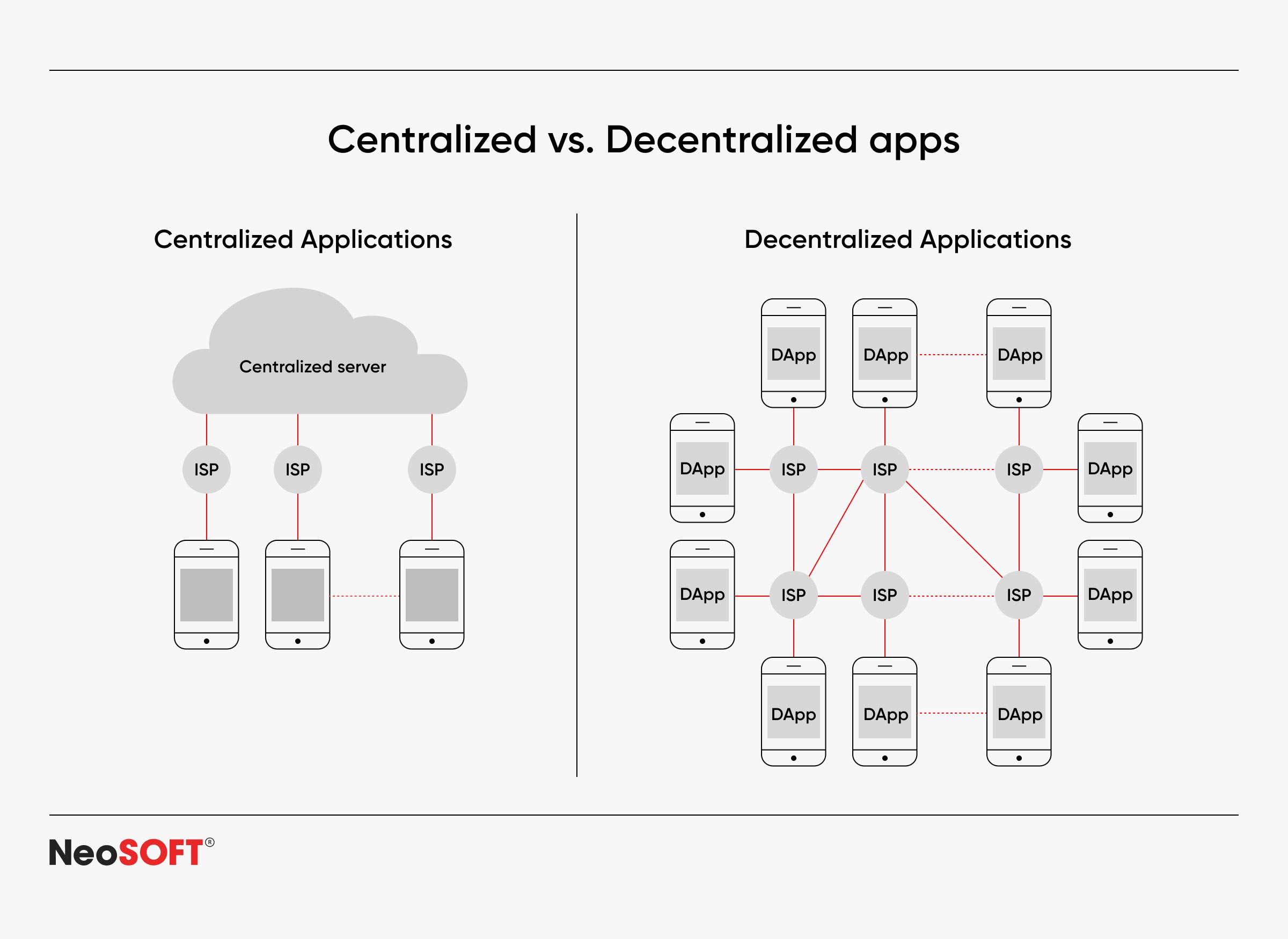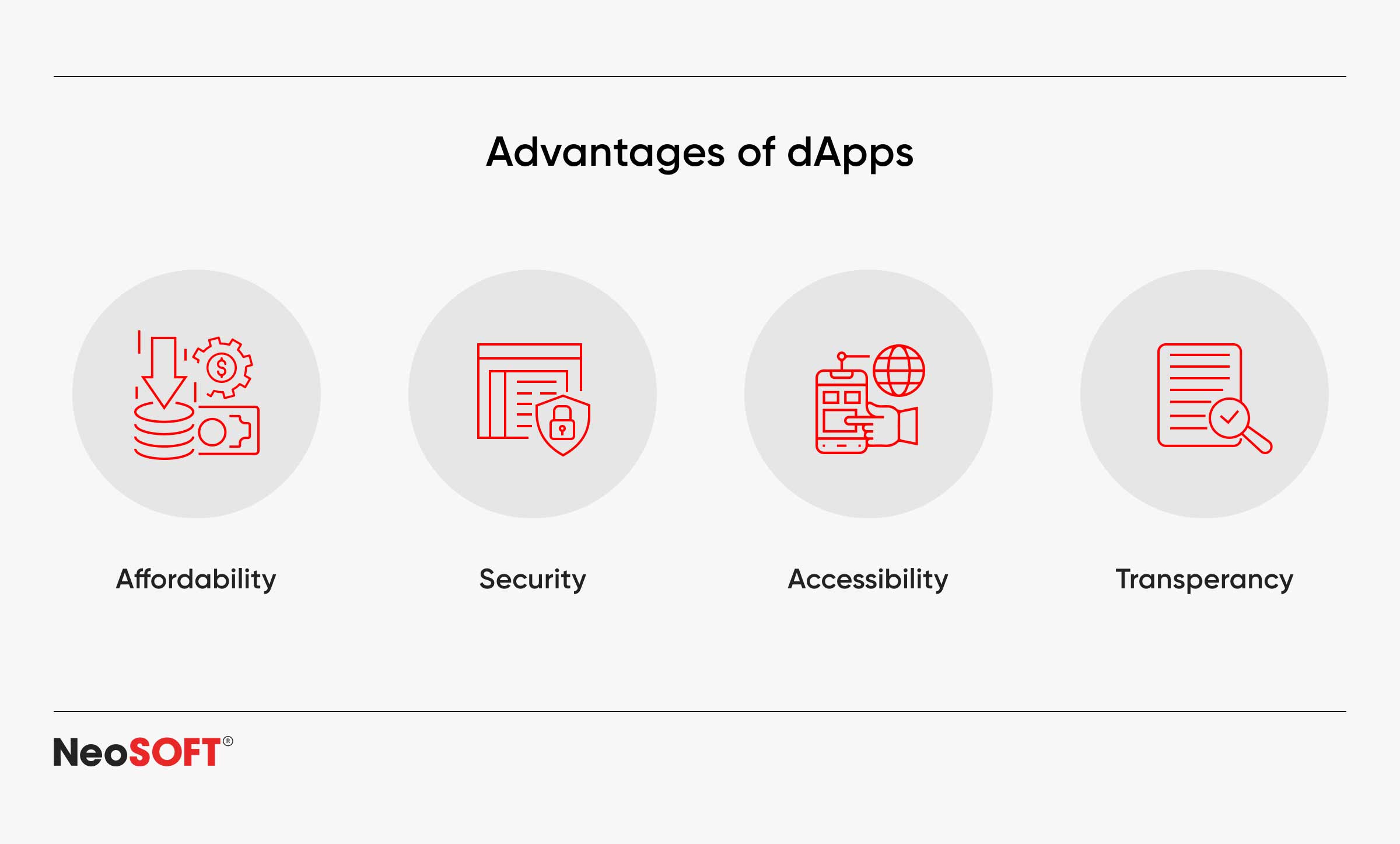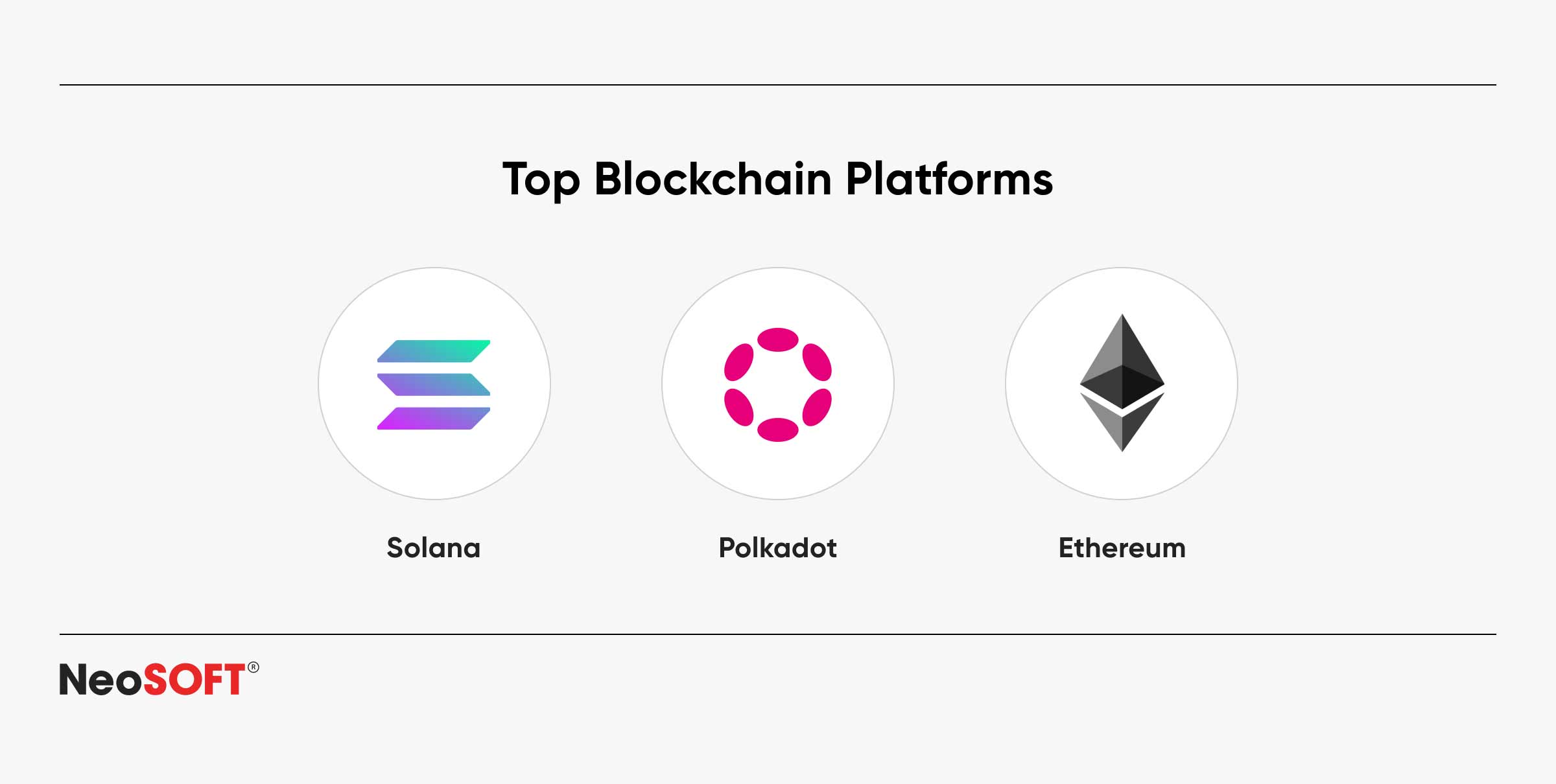Future Frontiers: Decentralized Applications in the Blockchain Industry
Introduction
Blockchain technology has achieved previously unattainable levels of efficiency, transparency, and security, and has radically changed industry operations. As mentioned in one of our previous blogs. Cryptocurrency was the first implementation of blockchain, Bitcoin in particular, and is still the most popular application of blockchain technology today. Decentralized applications and other more sophisticated blockchain solutions were made possible by its introduction in 2008 as a decentralized currency operating on a peer-to-peer network.
These developments have boosted the popularity of distributed ledger technology and spurred blockchain innovation across numerous industries. Blockchain technology has been adopted by many different kinds of industries in the past few years, including government, e-learning, healthcare, and banking. The most recent big development in blockchain technology are decentralized apps, which have already made significant contributions.
This blog will look at the emergence of decentralized applications, their features, how they affect software development in various industries, and their benefits and drawbacks for blockchain developers in particular and software development specialists in general. Executives, IT professionals, and blockchain developers for software development companies can use blockchain technology to address challenges they face in new and innovative ways across a variety of industries.
Decoding Decentralized Applications
Defining dApps
Decentralized applications, or dApps, as mentioned above, are software applications that function on blockchain networks as opposed to conventional centralized servers. Unlike traditional programs that depend on central servers for hosting and management, a decentralized application operates on decentralized systems or networks, usually based on a blockchain platform. Decentralized apps exist in decentralized networks, whereby no one single party has complete control over the application data or functioning.
Some key characteristics of dApps are:
- Open-source architecture – Developers are allowed to add to and experiment with the codebase because it is frequently available for review.
- Blockchain-based infrastructure – Blockchain networks serve as the backend for dApps, guaranteeing transparency, security, and immutability.
- Decentralized control – A decentralized setup involves managing an application through a network of multiple nodes rather than just one.
Smart Contracts and dApp Development
dApps are powered by smart contracts, which automate operations and transactions minus the middlemen. These self-executing smart contracts enhance efficiency by reducing the need for human control and beginning their function when the previously specified conditions are met. Ethereum, Polkadot, and Solana are a few well-known blockchain platforms that offer the necessary infrastructure to develop smart contracts and decentralized exchanges.
The most well-known features of Ethereum are its extensive use and strong developer community, but its scalability problems cause significant transaction costs. Although they are somewhat newer and less thoroughly vetted than Ethereum, platforms like Polkadot and Solana seek to overcome these restrictions by providing lower fees and faster transaction speeds for decentralized exchanges.
Key Benefits of dApps
Privacy and Security
One of the main benefits of a decentralized application is the increased security. By running on a distributed network of nodes, dApp development lessens the possibility of centralized points of failure, which are major vulnerabilities in traditional systems.
When data is dispersed among numerous network nodes with multiple participants, it is less vulnerable to hacking, tampering, and single-point assaults. This decentralized app framework assures that organizations can protect sensitive data, improve privacy, and enhance security, mitigating the security concerns inherent in centralized approaches.
Trust and Transparency
dApps operate on the blockchain network’s distributed ledger to make transactional data available to all blockchain network participants, increasing transparency. This builds trust among stakeholders because the data is verifiable and irreversible, eliminating any need for intermediaries. Enterprises using blockchain apps can benefit from enhanced security and confidence from customers, partners, and regulators because every transaction and system change is documented and auditable in real-time.
Operational Efficiency
Operational efficiency is increased by a decentralized application because it does not require centralized servers or middlemen. The decentralized nature of the network reduces the possibility of downtime due to security breaches or system failures, increasing availability and dependability.
Smart contract development and automation also enable activities beyond cryptocurrency transactions, including transaction settlements, other smart contracts themselves, and procedures to be carried out with minimal manual intervention, simplifying operations for developers and businesses alike.
Affordability
dApps also offer reduced expenses, notably in terms of transaction fees. Traditional systems frequently suffer higher expenses because transactions are managed by centralized intermediaries (like banks or clearinghouses).
Since dApps operate autonomously using smart contract functionality, transaction costs are reduced, eliminating the need for costly centralized infrastructure upkeep. In time, these reduced operational and transaction costs can lead to significant savings for companies, making dApps an appealing long-term solution.
The Impact of dApp Development Across Industries
Finance
Financial institutions that operate as middlemen to assist with financial transactions within the banking industry – such as borrowing, trading, lending, investment opportunities, and wealth portfolio management – are no longer necessary when it comes to decentralized finance, or DeFi. With platforms like Compound, Aave, and Uniswap leading the way, the rapid expansion of decentralized financial products has thrust DeFi to the very forefront of dApp applications in the financial sector.
Users on blockchain-based platforms can earn interest and apply for loans right away using smart contracts. Worldwide customers benefit from this disintermediation by having access to better prices and increased power.
Supply Chain and Manufacturing
The adoption of dApps has improved supply chain management’s effectiveness, transparency, and traceability. The immutability of blockchain technology records facilitates the process of confirming the authenticity of products.
To ensure data accuracy and decrease fraud, businesses can utilize a decentralized ledger to track things at every stage, from the development phase through manufacturing, delivery, and distribution. In an effort to promote regulatory and consumer confidence, the pharmaceutical, food, and luxury goods industries are already exploring or putting blockchain-based solutions into practice.
Healthcare
The healthcare industry benefits from decentralized applications because they are capable of securely handling patient records and health data. By restricting access to those who are authorized and preserving confidentiality and privacy, a blockchain network offers patients more authority over their medical records.
Additionally, by collaborating more effectively, medical personnel can reduce data silos across clinics, hospitals, and labs. Clinical trials and medication tracking are other areas where dApps are helpful in enhancing accountability and lowering fraud in healthcare distribution networks and research.
Gaming and Entertainment
The entertainment sector has quickly embraced dApps, particularly in light of the increasing popularity of blockchain- and non-fungible token-powered games. These platforms give players legitimate ownership rights over real world assets, in-game items, collectibles, and virtual goods.
dApps enable users to trade, buy, sell, and make money by rewarding them with digital currencies or other digital assets under “play-to-earn” models. Games, including Axie Infinity and Decentraland, have helped popularize this approach, opening up new ways for gamers and content providers to finance their projects.
Other Sectors
dApps are becoming more popular outside of these sectors as well, in fields including education, social networking, and administration.
Decision-making processes become transparent when stakeholders may use blockchain tokens to cast their votes on proposals through decentralized governance platforms. In the education industry, decentralized learning platforms enable tamper-proof, secured certification and assessment systems, ensuring that academic credentials and records are properly safeguarded and easily verifiable.
In social media, dApps provide censorship-resistant alternatives while retaining control over content creators’ data and earnings. Similarly, in terms of intellectual property, blockchain enables creators to guarantee ownership of their work by offering transparent licensing and user records without the need for centralized authorities.
Challenges to Effective dApp/Blockchain Adoption
Scalability Issues
Scalability is one of the main issues decentralized app development services face. The most popular blockchain solutions now in use frequently encounter network congestion and transaction speed constraints, particularly during peak demand. The system may slow down considerably as the volume of users and interactions rises, leading to disruptions and increased transaction costs. This restriction impairs decentralized app development services and performance and may discourage companies from implementing blockchain solutions.
Accessibility and User Experience
Another important obstacle to widespread adoption is the complexity of dApps. Several decentralized platforms already in use demand a high level of technical expertise, which could turn away non-technical users. To encourage broad acceptance, better user interfaces and user experiences (UI/UX) are necessary. Making transactions easier and offering educational materials can assist in bridging the knowledge gap for consumers who are not familiar with blockchain protocols, thus increasing its usability and accessibility.
Regulatory Concerns
Regulatory ambiguity is a significant obstacle to businesses and developers of a decentralized app. Particularly when it comes to data privacy, transactions, and consumer protection, businesses must navigate various different rules and regulations from multiple jurisdictions. The regulatory environment is always changing, which might be dangerous for dApp growth and market stability as authorities continue to create laws concerning cryptocurrencies and blockchain technology.
Consumer Adoption
Lastly, obstacles pertaining to market penetration stand in the way of dApps’ broad adoption. Strong developer talent with knowledge of blockchain technologies and the infrastructure needed for developing decentralized applications are required by many enterprises. The creation and adoption of dApps within businesses can be hindered by the current lack of skilled dApp developers.
Adoption attempts are also made more difficult by the technical challenges involved in integrating dApps with current legacy systems. These obstacles need to be removed if dApps are to fulfill their full potential across industries and advance a more decentralized future.
The Future of Blockchain
Conventional centralized models are rapidly being replaced by decentralized systems and user autonomy, which are in more demand. Decentralized web and mobile apps offer a solution by eliminating middlemen and granting consumers direct ownership of their data in a world where people are becoming more and more concerned about data security, privacy, and control. The decentralized structure of dApps makes for more secure, transparent, and robust platforms which empower both individuals and enterprises.
The constraints of dApps are being tackled now by new technology developments as the blockchain ecosystem develops. In order to increase scalability, layer 2 solutions – like rollups and state channels – are being developed.
These solutions handle transactions off-chain while preserving the primary blockchain’s security. Also, improved connectivity between various blockchain networks is made possible by sidechains and cross-chain interoperability, which enables dApps to run seamlessly on several platforms.
Thanks to large investments, advanced technologies, burgeoning developer communities, and increased enterprise interest in app development, the whole dApp development services ecosystem is growing quickly. Leading blockchain platforms leading this trend are Ethereum, Polkadot, and Solana, which provide tools and development environments to help create dApps.
A positive feedback loop is being generated by this growing ecosystem of dApp development platforms, which is drawing in more developers to create creative solutions and drawing in companies looking to capitalize on blockchain solutions. Because of this, the dApp development market is becoming more diverse, with applications in fields like healthcare and finance.
dApps will continue to be essential to the whole development process of blockchain technology owing to its capacity to disrupt established systems and promote cooperation across global corporations.
Conclusion
A cutting-edge new method for people and organizations to communicate with digital systems is presented through decentralized platforms and applications. Decentralized systems offer a plethora of advantages for businesses looking to get and stay ahead of the curve and stay innovative in the rapidly evolving digital landscape, including greater transparency, privacy, and productivity. dApps are creating new opportunities for industries such as smart contract development services, healthcare, and supply chain management.
Now is the perfect moment for exploring decentralized solutions with blockchain technology. Working with experienced blockchain developers who can ensure safe, efficient, and future-ready solutions will help you overcome the difficulties associated with blockchain development. NeoSOFT offers you just that! Get in touch with our team right now at info@neosofttech.com and find out how our dApp development services can revolutionize your business models and ensure your long-term success.










